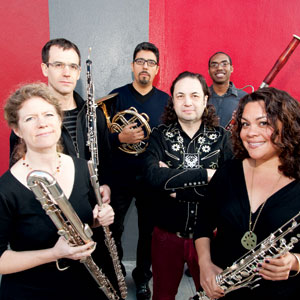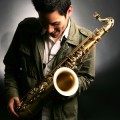From the Desert expanses near Laredo, Texas, haunting stories reveal themselves through extended techniques on a bass clarinet. Discarded objects left behind by immigrants crossing the border—a shoe, a juice can, pieces of rope—are now amplified with contact microphones. A French horn provides breathy counterpoint to multiharmonics and embouchure experiments on a bass flute.
To composer Guillermo Galindo, these are voices from the desert, Voces del Desierto, a work MACLA commissioned him to write for Quinteto Latino, a not-so-conventional wind ensemble. The piece will be debuted this weekend.
Galindo, an established electro-acoustic composer based in the East Bay, drew inspiration for the project when he, along with Quinteto Latino director Armando Castellano and videographer Marvin Barrera, traveled to the U.S./Mexico border at Laredo one year ago. During three days of intense and emotional work, they connected with memories of the immigrants’ experience by gathering personal items the immigrants left behind along the way: a rusted aluminum can, a child’s backpack, some desiccated tangerine skin, a red wool knit cap, a piece of rope and other objects.
Eventually, the items were shipped back to the Bay Area where they have now become sonic instruments of reconnection for Voces del Desierto. For example, Galindo converts a juice can into the resonating chamber for a stringed instrument that can be plucked or played with a bow.
Another instrument, a kind of loom, provides a whooshing sound made from the sewn-together pieces of fabric moving through the apparatus. To amplify these objects, he attaches piezoelectric elements to pick up the resonances and then wires them to 1/4-inch jacks for audio output. Together, they complement the instrumentation of the quintet: bass flute, bass clarinet, French horn, oboe and bassoon. The amplified found objects seem to function as sonic leftovers, relics from the personal lives of those we do not necessarily know.
“Each personal object has its own voice, sound and its own imaginary story,” Galindo explains. “My interest in the Mesoamerican, non-Western concept of music and sound is based on the meaning and function of personal objects in our lives. These objects have a particular sound and meaning connected to the lives of other human beings. I hope this piece contributes to cure the social wounds associated with immigration.”
The objects were part of the compositional concept from the very beginning. The crew traveled to the desert envisioning the totality of an interdisciplinary piece addressing the subject of immigration—but in unconventional ways. Discarded consumer materials became part of the orchestration and, perhaps, even sonic avatars of the immigrant plight.
“The experiment was to take music composition into a whole new realm,” said Galindo. “I believe that the traditional idea of a composition exclusively being just music written on paper must venture beyond musical borders. Voces del Desierto dares to cross borders, incorporating people, ritual, objects, imaginary stories and performance in the composition.”
The score is not conventional either. The first movement, “El aire se vuelve suspiro,” for instance, features quite a few extended techniques during the first two minutes. Some of the parts involve specific contours of multiphonics or singing through the embouchure. Many times, the player removes the reed during certain passages or sings through the instrument.
The audience will hear elaborate vibratos, lip pizzicatos, key clicks, breath-driven passages and French horn parts with the valve slides removed. Since the bass flute and bass clarinet are more resonant than their higher-pitched cousins, the first movement emotes abstract and, as the title suggests, breathy atmospheric elements, perhaps indicative of the uncertainty and haziness of desert migration, where everything is at stake.
“I was gifted with musicians who are extremely proficient,” Galindo says. “They will be also playing drums. The members of Quinteto Latino play lots of instruments and the ranges that these instruments cover are a delight for any composer.”
Voces del Desierto
Friday-Saturday at 8pm, Sunday at 2pm; $10-$15
MACLA , 510 S. First St., San Jose; 408.998.ARTE

 Review: Pizza Bocca Lupo in San Jose
Review: Pizza Bocca Lupo in San Jose  Books: The Adventures and History of San Jose, California
Books: The Adventures and History of San Jose, California 


